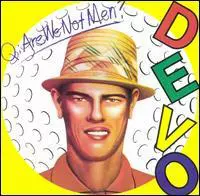Devo is the kind of band that breeds obsessive fans, and this album is ground zero. They had been making weirdo synth art rock in Akron, OH since 1973, but didn’t put out this proper first album until 1978. They had already built up a reputation for their unique and well-honed aesthetic early on and their nerdy take on punk antagonism of crowds at shows. There’s an interview in the Onion AV Club from way back where band leader Mark Mothersbaugh recounts a tale of playing “Jocko Homo” at a show in their early days, repeating the titular lines ”Are we not men? We are Devo!” for over ten minutes until people in the crowd were on stage trying to physically pull their instruments away from them to make them stop.
These antics set them apart but it was the unheard sound and well-crafted songs that got them signed to Warner Bros. and got well-known synth guru Brian Eno tapped to produce. The product is the amazing debut Are We Not Men? We Are Devo!, a classic album that crosses multiple genres from punk to post punk to new wave to art rock. The Mothersbaugh brothers and the Casale brothers, along with Alan Myers (not an original member, but the drummer that solidified the lineup), created their own world of human de-evolution (hence the name Devo) and it caught on with a certain crowd in a big way. That crowd included David Bowie and Iggy Pop, who helped get them signed to Warner Bros., as well as Neil Young, who cast them his film Human Highway. After this debut record came out, they nabbed a spot on Saturday Night Live and Devo was pumped into the homes of millions of normies. These days it’s hard to imagine a band as outta-left-field as Devo making it this big.
The album followed through on all the early expectations. It’s a delightfully odd record, which, despite its jerky drums, pointy guitars and unique synth tones, was very singable and catchy in it’s own way. Are We Not Men? is a more guitar-based affair than their later work, with the clean robo-funky guitars and buzzing and blooping synths holding equal ground. It’s their most “rock” record, but not like any rock in 1978, mainstream or otherwise. Their closest contemporaries in arty and jaunty rock would be the Talking Heads (who also recorded with Eno early on), and synth pioneers Kraftwerk and Gary Numan who share some arty sensibilities and keyboard knob-twiddlin’ skills, but these two artists don’t sound punk like Devo does.
From Eno’s home base at the time, Cologne, Germany, Devo crafted their manifesto about the conformity and mindlessness of the American masses. Opener “Uncontrollable Urge,” one of my favorite Devo songs of their whole catalog, presents an instant shout-along buildup of ”yeah yeah yeah yeah”s and tears the album open. In an interesting tracklist decision they follow it up with a cover, their iconic take on the Rolling Stones’ “(I Can’t Get No) Satisfaction.” It works that early in the album because it declares their cynical take on the world by taking a “manly” song and sucking all the swagger right out of it. Myers plays his acoustic kit like a machine, with an unwavering pattern throughout, as Mark Mothersbaugh employs his signature yelp.
“Mongoloid” and “Jocko Homo” fill the strong middle portion of the record. ”Mongoloid, he was a mongoloid / Happier than you and me” hammers home their de-evolution theme about the brainless existence of the average American. Over odd meters, “Jocko Homo” continues on about Monkey men in business suits and that ”I can walk like an ape, talk like an ape, I can do what monkey do”, and finishing with the back and forth of ”Are we not men? We are Devo!”, one of the most singable parts of the record.
“Gut Feeling” is another classic Devo track, with a slow instrumental build, eventually slamming home the title line, exploding into the punk second half “Slap Your Mammy.” The record ends on a weird note and we would expect no less, with “Sloppy” and “Shrivel-Up,” both a little gross in their delivery, and why not?
Devo broke the mold with their debut record, and even more than that, they formed their own mold. They were in a class all their own, paving the way for new wave but staying head and shoulders above the rest through the 80s. A must-have record for any record collection.
